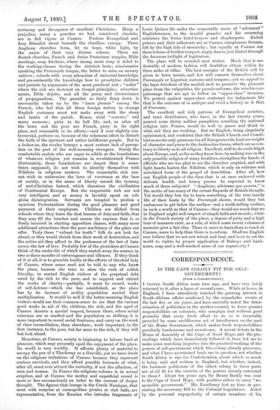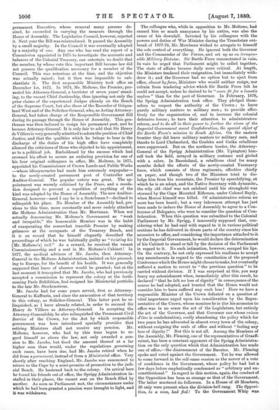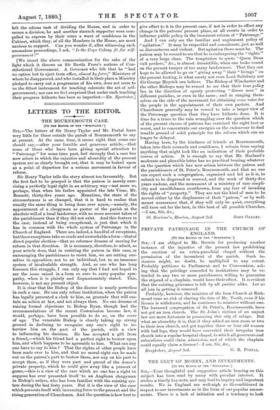CORRESPONDENCE.
IS THE CAPE COLONY FIT FOR SELF- GOVERNMENT?
[nog A CORRESPONDENT.] I visrrED South Africa some time ago, and have very lately returned to it, after a lapse of several years. While at home, in England, I have attentively watched the growing interest in South-African affairs awakened by the remarkable events of the last five or six years, and have carefully noted the deter- mination of politicians in the mother-country to force greater responsibilities on colonists, who complain (not without good grounds) that every fresh effort to do so is invariably preceded by some meddlesome act of interference on the part of the Home Government, which makes fresh responsibilities peculiarly burdensome and unwelcome. A recent debate in the House of Assembly of the Cape of Good Hope, and the pro- ceedings which have immediately followed it, have led me to make some searching inquiries into the practical working of the powers of self-government which this colony already possesses, and what I have ascertained leads me to question, not whether South Africa is ripe for Confederation, about which so much is being said and written in England, but whether, indeed, the foremost politicians of the oldest colony in these parts are at all fit for the exercise of the powers already entrusted. to them ? About ten years ago, Sir Henry Barkly was sent to the Cape of Good Hope, with positive orders to carry "re- sponsible government." His Excellency lost no time in pre- senting the necessary Bill to the Colonial Legislature. Aided. by the personal unpopularity of certain members of his permanent Executive, whose removal many persons de- sired, he succeeded in carrying the measure through the House of Assembly. The Legislative Council, however, rejected it. Next year the Bill was reintroduced. It passed the Assembly by a small majority. In the Council it was eventually adopted by a majority of one. Any one who has read the report of a Commission appointed in 1875 to investigate the accounts and balances of the Colonial Treasury, can entertain no doubt that the member, by whose vote this important Bill became law did not possess the qualification necessary for a member of the Council. This was notorious at the time, and the objection was actually raised ; but it then was impossible to sub- stantiate it. The first responsible Ministry took office on December 1st, 1872. In 1874, Mr. Molten, the Premier, pro- moted his Attorney-General, a barrister of seven years' stand- ing, to the vacant Chief Justiceship, thus ignoring not only the prior claims of the experienced Judges already on the Bench of the Supreme Court, but also those of the Recorder of Griqua- land West and of the Solicitor-General, who, as Acting Attorney- General, had taken charge of the Responsible Government Bill during its passage through the House of Assembly. This gen- tleman was then induced to resign his permanent post, and he became Attorney-General. It is only fair to add that Sir Henry (le Villiers is very generally admitted to adorn the position of Chief Justice, and that the qualities which he brings to bear in the discharge of the duties of his high office have completely silenced the criticisms of those who objected to his appointment, as to a political job. Emboldened by the success which had crowned his effort to secure an enduring provision for one of his four original colleagues in office, Mr. Molten, in 1875, appointed his Commissioner of Crown Lands and Public Works —whose idiosyncracies had made him extremely unpopular— to the newly-created permanent post of Controller and Auditor-General. The popular outcry was great. The ap- pointment was warmly criticised by the Press, and a resolu- tion designed to prevent a repetition of anything of the kind was adopted by the House of Assembly. The new Auditor- General, however—need I say he is a Scotchman P—declined to relinquish his place. No Member of the Assembly had, pre- vious to this time, more constantly and more rudely attacked the Molten() Administration than Mr. Merriman. When not actually denouncing Mr. Molteno's Government as " weak and incapable," the honourable Member was in the habit of exasperating the somewhat irascible Premier by making grimaces at the occupants of the Treasury Bench, and it is on record that he himself elegantly described the proceedings of which he was habitually guilty as " twisting his [Mr. Molteno's] tail." As a reward, he received the vacant Commissionership and a seat in Mr. Molteno's Cabinet ! In 1877, the medical advisers of Mr. Jacobs, then Attorney- General in the Molten Administration, insisted on his proceed- ing to Europe, for the benefit of his health. It was generally supposed that leave of absence would be granted; but at the last moment it transpired that Mr. Jacobs, who had previously accepted a commission to represent the colony at the forth- coming Paris Exhibition, had resigned his Ministerial portfolio to the late Mr. Stockenstrom.
Mr. Jacobs had for some years served, first as Attorney- General to Kaffraria, and since the annexation of that territory to this colony, as Solicitor-General. This latter post he re- linquished, as I have already related, in order to succeed Sir Henry de Villiers as Attorney-General. In accepting the Attorney-Generalship he also relinquished the Permanent Civil Service of the Crown, for the Act by which responsible government was here introduced specially provides that retiring Ministers shall not receive any pension. Mr. Molteno, however, who had by this time begun to re- gard himself as above the law, not only awarded a pen- sion to Mr. Jacobs, but fixed the amount thereof at a far higher sum than would, under the regulations governing such cases, have been due, had Mr. Jacobs retired when he did from a permanent, instead of from a Ministerial office. Very shortly after reaching England, Mr. Jacobs was summoned to return to the Cape by a semi-promise of promotion to the judi- cial Bench. He hastened back to the colony. On arrival here he found his friends out of office, the Sprigg Administration in- stalled in their places, the vacant seat on the Bench filled by another. As soon as Parliament met, the circumstances under which he had been granted a pension were brought to light, and it was withdrawn. The colleague who, while in opposition to Mr. Molteno, had caused him so much annoyance by his antics, was also the- cause of his downfall. Invested by his colleagues with the powers and duties of War Minister during the Transkeian out- break of 1877-78, Mr. Merriman wished to arrogate to himself the sole control of everything. He ignored both the Governor and the Commander of the Forces, and set up as an irrespon. sible Military Dictator. Sir Bartle Frere remonstrated in vain. In vain he urged that Parliament might be called together. The state of affairs became daily more critical. At length, the Ministers tendered their resignation, but immediately with- drew it ; and the Governor had no option but to eject from office, almost by force, Ministers who would neither resign, nor refrain from tendering advice which Sir Bartle Frere felt he- could not accept, unless he desired to be "more fit for a lunatic asylum" than for the post of Governor. In February, 1878,. the Sprigg Administration took office. They pledged them- selves to respect the authority of the Crown ; to leave purely military matters to military men ; to provide effec- tively for the organisation of, and to increase the colonial defensive forces ; to turn their attention to administrative reform, and to do all in their power to further the views of the Imperial Government anent Confederation, the special object of Sir Bartle Frere's mission to South Africa. On the eastern frontier they did leave military matters to• military men, and thanks to Lord Chelmsford, the Gealeka and Gaika rebellions: were suppressed. But on the northern border, the Attorney- General of the Sprigg Administration (Mr. Upington) him- self took the field, arrayed in military costume and girded with a sabre. In Basutoland, a rebellious chief for many months defied the efforts of the newly-created Yeomanry- force, which consists of three regiments, effective chiefly on paper, and though two of the Ministers tried to dis- lodge him from his mountain, the Premier by speechifying, at which he is an adept, and the Native Secretary with dynamite, the wily old chief was not subdued until his stronghold was stormed by the Cape Mounted Riflemen, under Colonel Bayly, when Morosi himself was killed. Of administrative reform no• more has been heard; but a very lukewarm attempt has just been made to induce the House of Assembly to agree to a Con- ference of Delegates, who were to consider the question of Con- federation. When this question was submitted to the Colonial Parliament by Mr. Sprigg, I innocently supposed that, con- sidering what he had said with regard to it in various political orations he has delivered in divers parts of the country since his accession to office, and considering the importance attached to it by the Imperial Government, he would declare the determination of his Cabinet to stand or fall by the decision of the Parliament. in regard to it. No such intimation, however, escaped his lips. On the contrary, he not only expressed his readiness to accept any amendments in regard to the constitution of the proposed Conference which the House might choose to make, but eventually suffered a motion to revert to "the previous question" to be carried without division. If I was surprised at this, you may fancy my astonishment when, immediately after this result, he- declared " that he felt no loss of dignity" in consequence of the• course he had adopted, and trusted that the House would not consider him to have suffered any such loss ! Here we have a responsible Minister of the Crown defeated on a question of vital importance urged upon his consideration by the Repre- sentative of the Crown, whose nominee he is (for his accession to. office was in no sense the act of the Legislature, but entirely the act of the Governor, and that Governor one whose raison, d'6tre is confederation), coolly abandoning the policy which for two years he has advocated in almost every town of the colony, without resigning the seals of office and without "feeling any loss of dignity !" But this is not all. Among the Members of the Assembly, Mr. Fleming, one of the representatives of Graaff- reinet, has been a constant opponent of the Sprigg Administra- tion on the only question which that Administration has made- one of office,—the disarmament of the Basntos. Mr. Fleming- spoke and voted against the Government. Yet he was allowed to come forward in the self-same session as the mover of a vote of confidence in the Government, whose policy he had but a few days before emphatically condemned as " arbitrary and un- constitutional." In regard to this motion, again, the conduct of the Opposition has been as strange as that of the Government. The latter mustered its followers. In a House of 68 Members,. 38 only were present when the division-bell rang. The Opposi- tion, to a man, had fled ! To the Government Whip was left the odious task of dividing the House, and in order to secure a division, he and another staunch supporter were com- pelled to express by their votes a want of confidence in the Cabinet, which they, of all the Members in the House, are most anxious to support. Can you wonder if, after witnessing such anomalous proceedings, I ask, "18 the Cape Colony fit for self- government ?"
[We insert the above communication for the sake of the light which it throws on Sir Bartle Frere's notions of Con- stitutional Government. A Governor who felt that he " had no option but to eject from office, almost by force," Ministers of whom he disapproved, and who installed in their place a Ministry pledged to carry out a programme of his own, does not seem to us the fittest instrument for teaching colonists the art of self- government; nor can we feel surprised that under such teaching their progress hitherto has been so imperfect.—En. Spectator.]




































 Previous page
Previous page